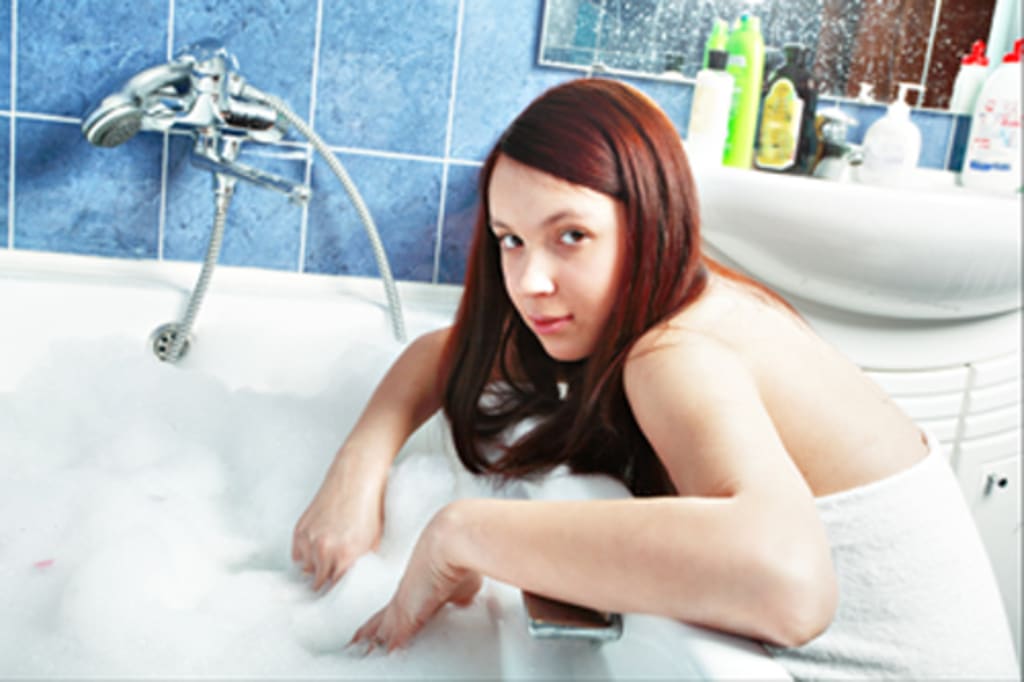Baths Can Be Cleansing in Many Ways
Mineral and Salt Baths

Not all salts are ‘salt,’ or, salt as we know it, which is technically Sodium Chloride.
Mineral baths are used for a variety of reasons, most commonly Epsom Salt baths. Epsom salt is actually Magnesium Sulfate, not Sodium Chloride. Epsom salt, named for a bitter saline spring at Epsom in Surrey, England, is not actually ‘salt,’ but a naturally occurring pure mineral compound of magnesium and sulfate. Long known as a natural remedy for a number of ailments, Epsom salt has numerous health benefits, as well as many beauty, household and gardening-related uses.
If your memory of high school chemistry is lacking or faded, here is a run-down of Mineral Salts and their uses as therapeutic baths.
Epsom Salt (Magnesium Sulfate)
Magnesium sulfate (or magnesium sulphate) is an inorganic salt (chemical compound) containing magnesium, sulfur and oxygen, with the formula MgSO4. It is often encountered as the heptahydrate sulfate mineral epsomite (MgSO4·7H2O), commonly called Epsom Salt. Studies have shown that magnesium and sulfate are both readily absorbed through the skin, making Epsom salt baths an easy and ideal way to enjoy the amazing health benefits. Magnesium plays a number of roles in the body including regulating the activity of over 325 enzymes, makes insulin more effective, reducing inflammation, helping muscle and nerve function and helping to prevent artery hardening. Sulfates help improve the absorption of nutrients, flush toxins and help ease migraine headaches.
Dead Sea Salts
Dead Sea salts have only a fraction of the sodium that table salt has—12 to 18 percent compared to 97 percent. Dead Sea Salt also contains Chloride and Bromide, Magnesium, Calcium and Potassium, in addition to Sodium. These minerals occur naturally in our bodies, and are vital to our overall health. Dead Sea salts are harvested from the Dead Sea, a mineral-rich body of water located between Jordan and Israel. Dead Sea salts carry many benefits, particularly when used as bath salts. Dead Sea salts effectively treat many skin conditions, including from rashes and psoriasis to more everyday conditions such as oily or dry skin. Dead Sea salts are also known to soothe rashes, calm allergic reactions, minimize dandruff and treat acne. Dead Sea salts have been known to improve the appearance of cellulite, manage the appearance of swelling due to water retention, and even treat hair loss. In addition, Dead Sea salts detoxify your skin, drawing out dirt, pollutants and impurities from each pore.
There is nothing more calming than a bath with Dead Sea salts; the minerals in Dead Sea salts, when combined with warm water, work to increase your circulation while decreasing your heart rate, reducing anxiety, and stress. Many swear by Dead Sea salts as an effective treatment for insomnia and other sleep disorders.
Himalayan Salt
Himalayan salts are considered the most pure salts in the world, and contain upwards of 84 minerals. Himalayan salt contains the minerals that are necessary for your health, including macrominerals and trace minerals. The macrominerals are needed in relative abundance and include calcium, chloride, iron, magnesium, phosphorus, potassium and sodium. The recommended daily amount of these macrominerals depends of your age, activity level, and general health. Calcium is the most common mineral in your body and is found in your bones and teeth, as well as playing a vital role in nerve and muscle health. Trace minerals are needed in small amounts for health, and those found in Himalayan salt include boron, chromium, copper, fluoride, iodine, manganese, molybdenum, selenium and zinc. Other minerals in Himalayan salt include aluminum, carbon, platinum, selenium, sulfur and titanium. In addition to being used as a bath salt, Himalayan salts are quite healthy and used in place of ordinary table salt due to their rich nutrient and mineral content.
Himalayan salts are known to cleanse and detoxify the skin, leaving it smoother, softer, and cleaner than ever before. The numerous minerals and nutrients found in Himalayan salts are released as they are mixed with warm water, and this solution is often referred to as “sole” or “brine water.”
Himalayan Salts are an effective treatment for common skin conditions such as dry skin, psoriasis, and acne. They can also be used to soothe insect bites, heal blisters, and even treat ailments that affect our joints, such as arthritis. If you suffer from premenstrual symptoms, a nice warm bath with Himalayan salts can calm your cramps and relieve the pressure and bloating associated with excess water retention. And if you have a difficult time getting to sleep, bathing with Himalayan salts can reduce stress and promote a better night’s sleep. When bathing with Himalayan salt, don’t be shy about how much you use—the higher the concentration of Himalayan salt in the water, the more beneficial your bath will be.
For those choosing to bathe with healing salts, remember to take your condition and your plan into consideration. For example, if you have a low heart rate, you wouldn’t want to use Dead Sea Salts at that particular time, as it is known to lower heart rate. Follow the guidance of your holistic consultant, your plan, and the warnings and treatments any health provider may be giving you. This information is to educate you to make wise choices in improving your quality of life!
A Tried and True Detox Bath
1 cup Epsom Salts
1 regular/small box Baking Soda
1 Tablespoon Ground Ginger
Diluted in warm bath.
Bathe for less than 30 minutes to detox, and over 45 minutes if you wish to absorb the nutrients.
About the Creator
Lisa LaRue-Baker
Lisa LaRue-Baker has been reading and writing since a young age. She has authored, edited and been a consultant on hundreds of articles, handouts and books. She is a tribal historian, musician, and registered natural health practitioner.






Comments
There are no comments for this story
Be the first to respond and start the conversation.